Psychology Report: Theories of Development and Social Roles
VerifiedAdded on 2020/10/22
|19
|5077
|198
Report
AI Summary
This report delves into the core concepts of psychology, focusing on life span development theories, including those proposed by Freud and Erikson, and their comparative analysis. It examines the relationship between psychological theories and various stages of human development, such as cognitive, behavioral, and biological theories, along with Gisele's maturational and attachment theories. Furthermore, the report investigates the impact of both biological and social factors on human behavior, exploring the 'nature vs. nurture' debate and the influence of social agents. The significance of social roles within health and social care settings is also discussed, considering different perspectives like functionalist, feminist, and Marxist approaches. The report concludes by summarizing the key findings and emphasizing the importance of understanding social roles for effective social integration and psychological well-being.
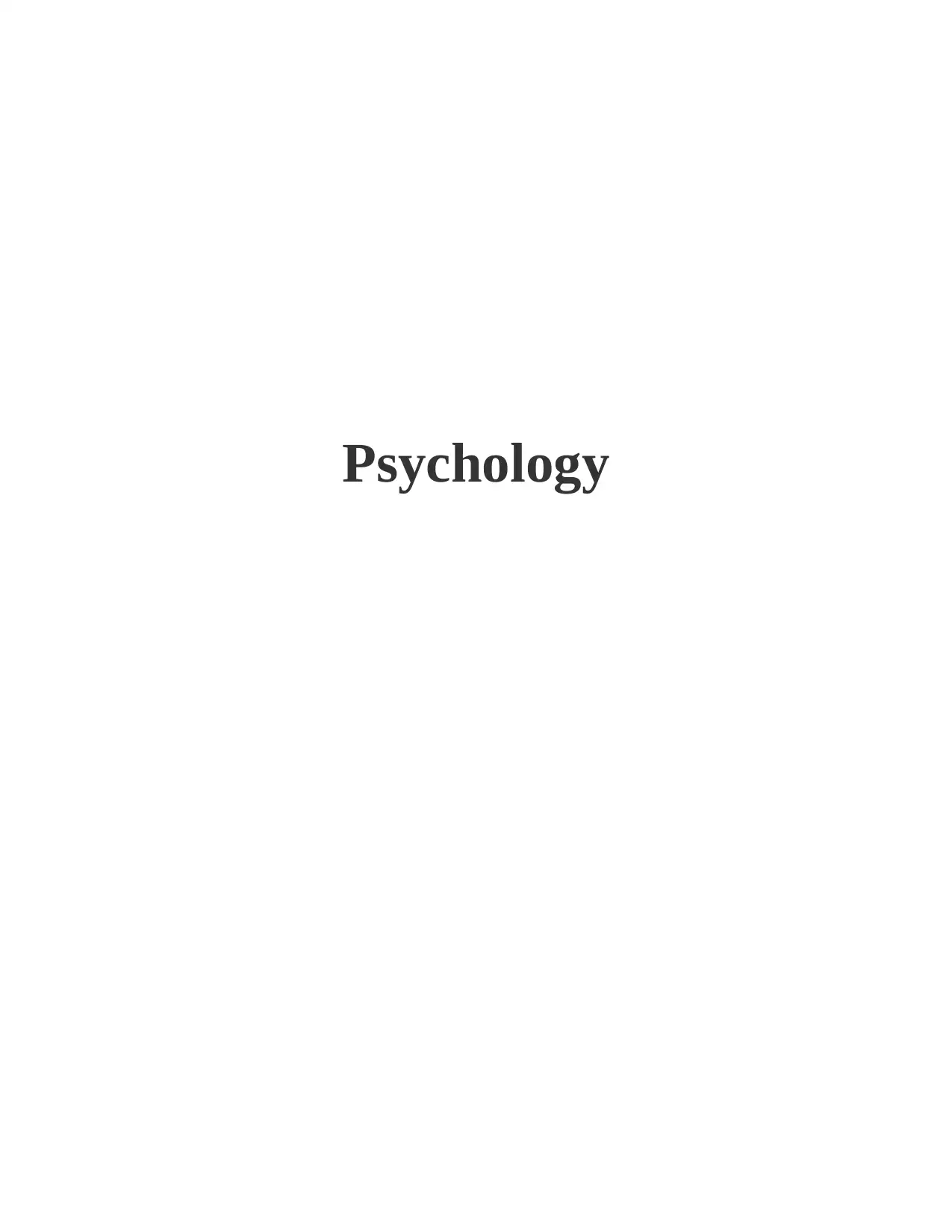
Psychology
Paraphrase This Document
Need a fresh take? Get an instant paraphrase of this document with our AI Paraphraser
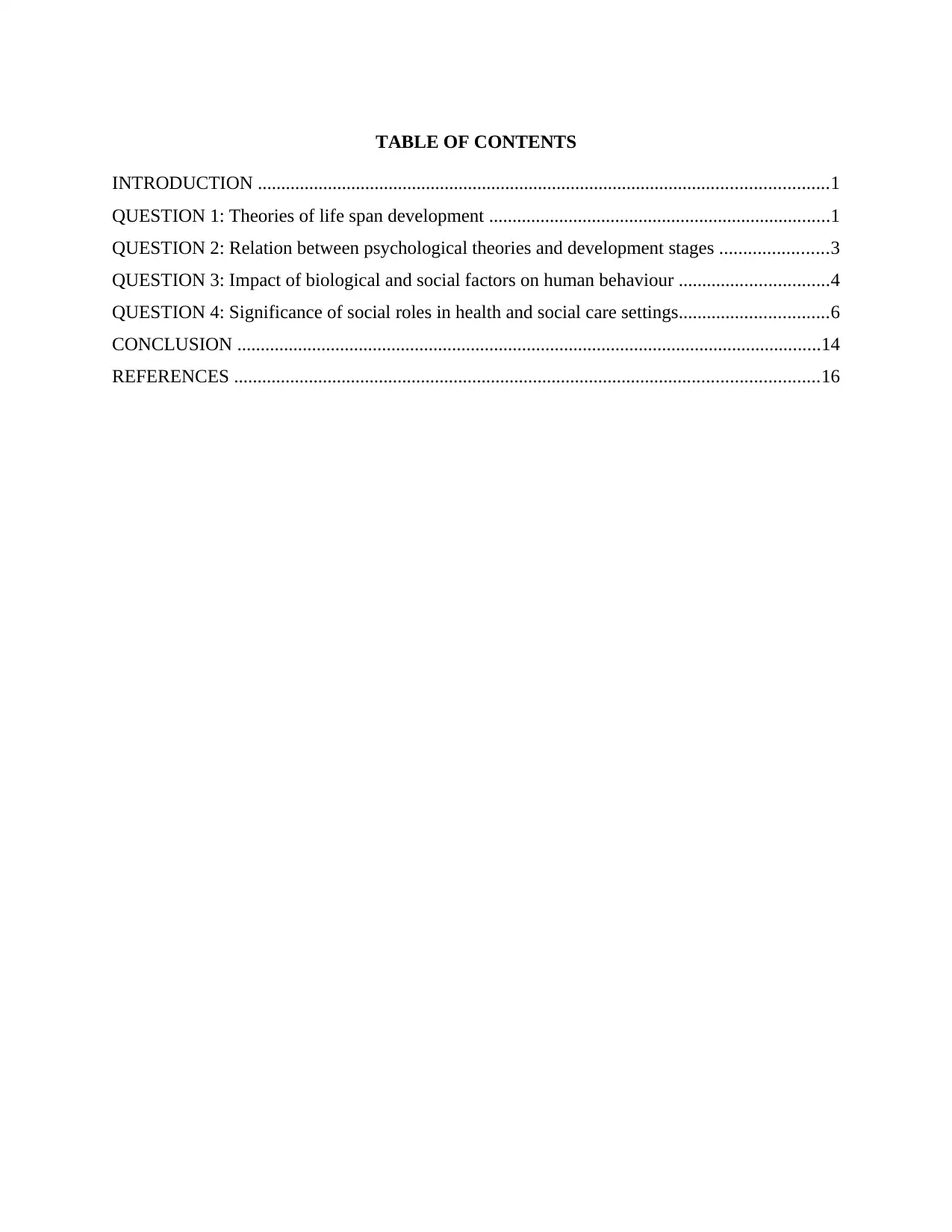
TABLE OF CONTENTS
INTRODUCTION ..........................................................................................................................1
QUESTION 1: Theories of life span development .........................................................................1
QUESTION 2: Relation between psychological theories and development stages .......................3
QUESTION 3: Impact of biological and social factors on human behaviour ................................4
QUESTION 4: Significance of social roles in health and social care settings................................6
CONCLUSION .............................................................................................................................14
REFERENCES .............................................................................................................................16
INTRODUCTION ..........................................................................................................................1
QUESTION 1: Theories of life span development .........................................................................1
QUESTION 2: Relation between psychological theories and development stages .......................3
QUESTION 3: Impact of biological and social factors on human behaviour ................................4
QUESTION 4: Significance of social roles in health and social care settings................................6
CONCLUSION .............................................................................................................................14
REFERENCES .............................................................................................................................16
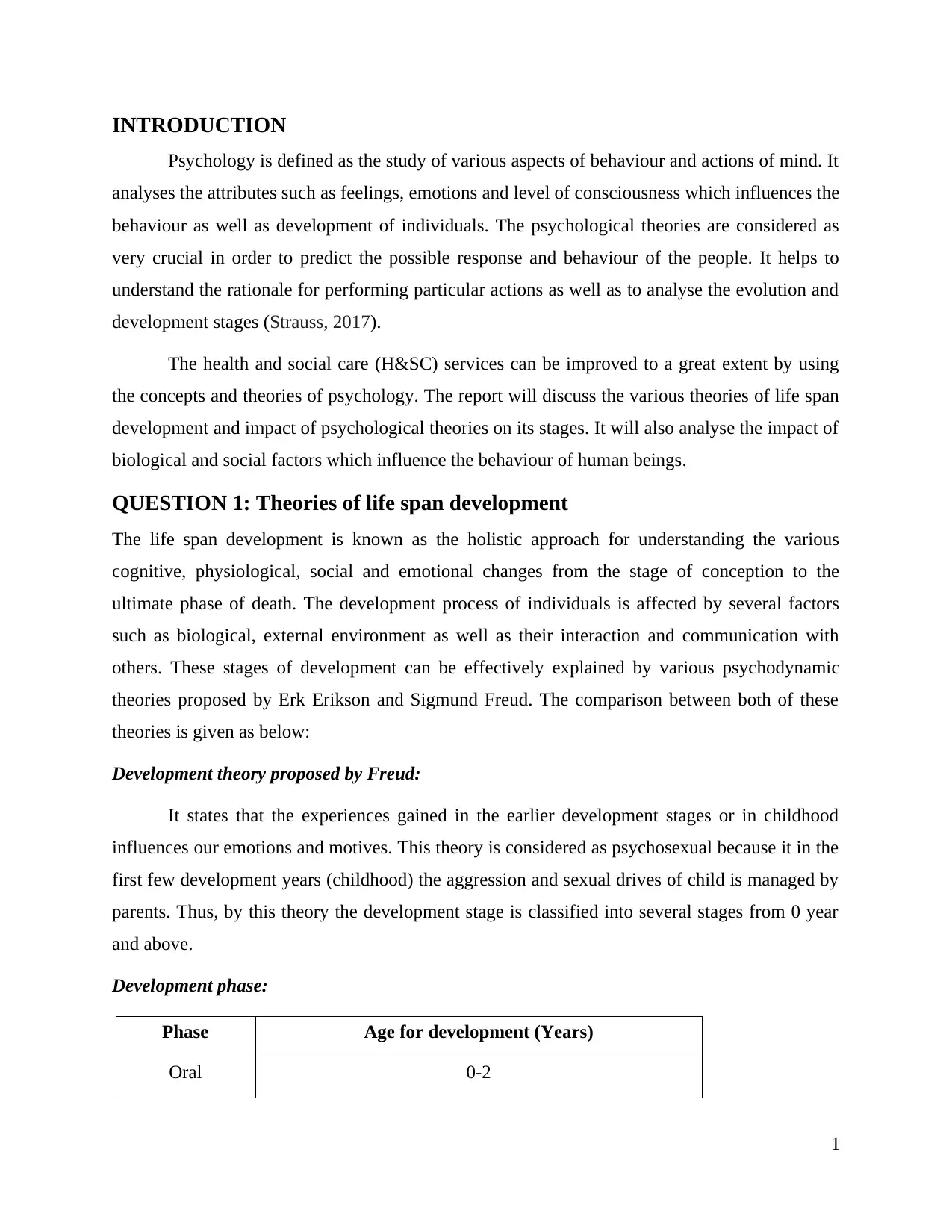
INTRODUCTION
Psychology is defined as the study of various aspects of behaviour and actions of mind. It
analyses the attributes such as feelings, emotions and level of consciousness which influences the
behaviour as well as development of individuals. The psychological theories are considered as
very crucial in order to predict the possible response and behaviour of the people. It helps to
understand the rationale for performing particular actions as well as to analyse the evolution and
development stages (Strauss, 2017).
The health and social care (H&SC) services can be improved to a great extent by using
the concepts and theories of psychology. The report will discuss the various theories of life span
development and impact of psychological theories on its stages. It will also analyse the impact of
biological and social factors which influence the behaviour of human beings.
QUESTION 1: Theories of life span development
The life span development is known as the holistic approach for understanding the various
cognitive, physiological, social and emotional changes from the stage of conception to the
ultimate phase of death. The development process of individuals is affected by several factors
such as biological, external environment as well as their interaction and communication with
others. These stages of development can be effectively explained by various psychodynamic
theories proposed by Erk Erikson and Sigmund Freud. The comparison between both of these
theories is given as below:
Development theory proposed by Freud:
It states that the experiences gained in the earlier development stages or in childhood
influences our emotions and motives. This theory is considered as psychosexual because it in the
first few development years (childhood) the aggression and sexual drives of child is managed by
parents. Thus, by this theory the development stage is classified into several stages from 0 year
and above.
Development phase:
Phase Age for development (Years)
Oral 0-2
1
Psychology is defined as the study of various aspects of behaviour and actions of mind. It
analyses the attributes such as feelings, emotions and level of consciousness which influences the
behaviour as well as development of individuals. The psychological theories are considered as
very crucial in order to predict the possible response and behaviour of the people. It helps to
understand the rationale for performing particular actions as well as to analyse the evolution and
development stages (Strauss, 2017).
The health and social care (H&SC) services can be improved to a great extent by using
the concepts and theories of psychology. The report will discuss the various theories of life span
development and impact of psychological theories on its stages. It will also analyse the impact of
biological and social factors which influence the behaviour of human beings.
QUESTION 1: Theories of life span development
The life span development is known as the holistic approach for understanding the various
cognitive, physiological, social and emotional changes from the stage of conception to the
ultimate phase of death. The development process of individuals is affected by several factors
such as biological, external environment as well as their interaction and communication with
others. These stages of development can be effectively explained by various psychodynamic
theories proposed by Erk Erikson and Sigmund Freud. The comparison between both of these
theories is given as below:
Development theory proposed by Freud:
It states that the experiences gained in the earlier development stages or in childhood
influences our emotions and motives. This theory is considered as psychosexual because it in the
first few development years (childhood) the aggression and sexual drives of child is managed by
parents. Thus, by this theory the development stage is classified into several stages from 0 year
and above.
Development phase:
Phase Age for development (Years)
Oral 0-2
1
⊘ This is a preview!⊘
Do you want full access?
Subscribe today to unlock all pages.

Trusted by 1+ million students worldwide
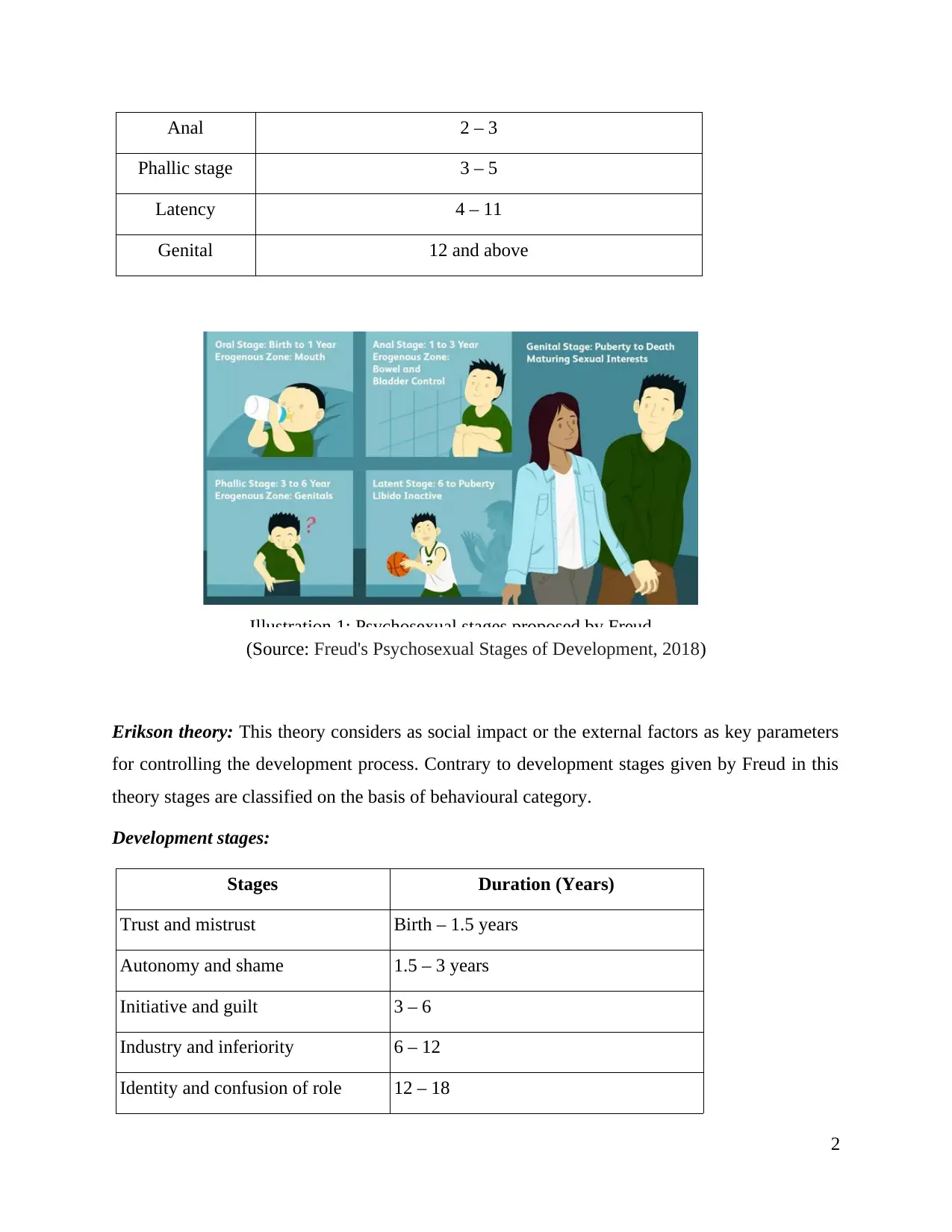
Anal 2 – 3
Phallic stage 3 – 5
Latency 4 – 11
Genital 12 and above
(Source: Freud's Psychosexual Stages of Development, 2018)
Erikson theory: This theory considers as social impact or the external factors as key parameters
for controlling the development process. Contrary to development stages given by Freud in this
theory stages are classified on the basis of behavioural category.
Development stages:
Stages Duration (Years)
Trust and mistrust Birth – 1.5 years
Autonomy and shame 1.5 – 3 years
Initiative and guilt 3 – 6
Industry and inferiority 6 – 12
Identity and confusion of role 12 – 18
2
Illustration 1: Psychosexual stages proposed by Freud
Phallic stage 3 – 5
Latency 4 – 11
Genital 12 and above
(Source: Freud's Psychosexual Stages of Development, 2018)
Erikson theory: This theory considers as social impact or the external factors as key parameters
for controlling the development process. Contrary to development stages given by Freud in this
theory stages are classified on the basis of behavioural category.
Development stages:
Stages Duration (Years)
Trust and mistrust Birth – 1.5 years
Autonomy and shame 1.5 – 3 years
Initiative and guilt 3 – 6
Industry and inferiority 6 – 12
Identity and confusion of role 12 – 18
2
Illustration 1: Psychosexual stages proposed by Freud
Paraphrase This Document
Need a fresh take? Get an instant paraphrase of this document with our AI Paraphraser
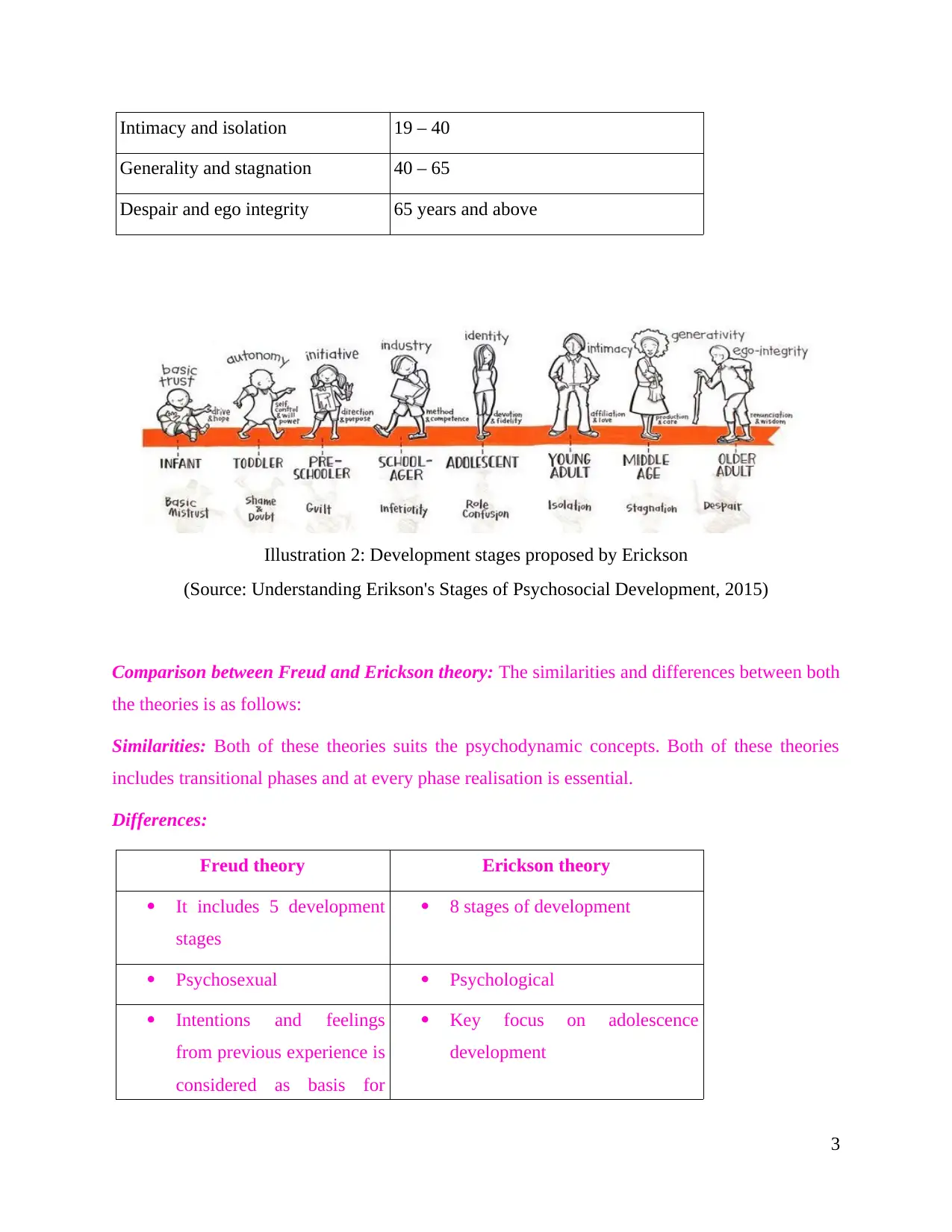
Intimacy and isolation 19 – 40
Generality and stagnation 40 – 65
Despair and ego integrity 65 years and above
(Source: Understanding Erikson's Stages of Psychosocial Development, 2015)
Comparison between Freud and Erickson theory: The similarities and differences between both
the theories is as follows:
Similarities: Both of these theories suits the psychodynamic concepts. Both of these theories
includes transitional phases and at every phase realisation is essential.
Differences:
Freud theory Erickson theory
It includes 5 development
stages
8 stages of development
Psychosexual Psychological
Intentions and feelings
from previous experience is
considered as basis for
Key focus on adolescence
development
3
Illustration 2: Development stages proposed by Erickson
Generality and stagnation 40 – 65
Despair and ego integrity 65 years and above
(Source: Understanding Erikson's Stages of Psychosocial Development, 2015)
Comparison between Freud and Erickson theory: The similarities and differences between both
the theories is as follows:
Similarities: Both of these theories suits the psychodynamic concepts. Both of these theories
includes transitional phases and at every phase realisation is essential.
Differences:
Freud theory Erickson theory
It includes 5 development
stages
8 stages of development
Psychosexual Psychological
Intentions and feelings
from previous experience is
considered as basis for
Key focus on adolescence
development
3
Illustration 2: Development stages proposed by Erickson
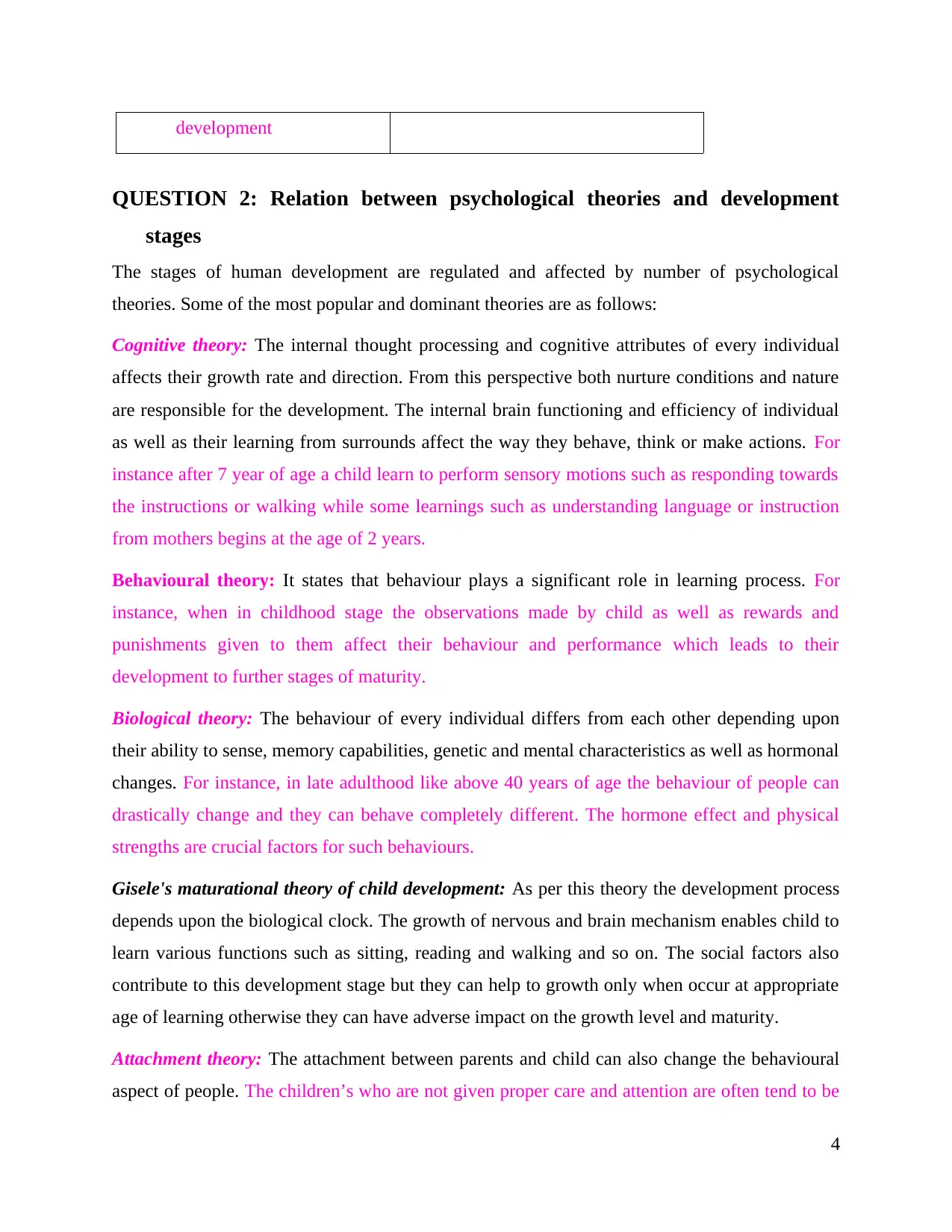
development
QUESTION 2: Relation between psychological theories and development
stages
The stages of human development are regulated and affected by number of psychological
theories. Some of the most popular and dominant theories are as follows:
Cognitive theory: The internal thought processing and cognitive attributes of every individual
affects their growth rate and direction. From this perspective both nurture conditions and nature
are responsible for the development. The internal brain functioning and efficiency of individual
as well as their learning from surrounds affect the way they behave, think or make actions. For
instance after 7 year of age a child learn to perform sensory motions such as responding towards
the instructions or walking while some learnings such as understanding language or instruction
from mothers begins at the age of 2 years.
Behavioural theory: It states that behaviour plays a significant role in learning process. For
instance, when in childhood stage the observations made by child as well as rewards and
punishments given to them affect their behaviour and performance which leads to their
development to further stages of maturity.
Biological theory: The behaviour of every individual differs from each other depending upon
their ability to sense, memory capabilities, genetic and mental characteristics as well as hormonal
changes. For instance, in late adulthood like above 40 years of age the behaviour of people can
drastically change and they can behave completely different. The hormone effect and physical
strengths are crucial factors for such behaviours.
Gisele's maturational theory of child development: As per this theory the development process
depends upon the biological clock. The growth of nervous and brain mechanism enables child to
learn various functions such as sitting, reading and walking and so on. The social factors also
contribute to this development stage but they can help to growth only when occur at appropriate
age of learning otherwise they can have adverse impact on the growth level and maturity.
Attachment theory: The attachment between parents and child can also change the behavioural
aspect of people. The children’s who are not given proper care and attention are often tend to be
4
QUESTION 2: Relation between psychological theories and development
stages
The stages of human development are regulated and affected by number of psychological
theories. Some of the most popular and dominant theories are as follows:
Cognitive theory: The internal thought processing and cognitive attributes of every individual
affects their growth rate and direction. From this perspective both nurture conditions and nature
are responsible for the development. The internal brain functioning and efficiency of individual
as well as their learning from surrounds affect the way they behave, think or make actions. For
instance after 7 year of age a child learn to perform sensory motions such as responding towards
the instructions or walking while some learnings such as understanding language or instruction
from mothers begins at the age of 2 years.
Behavioural theory: It states that behaviour plays a significant role in learning process. For
instance, when in childhood stage the observations made by child as well as rewards and
punishments given to them affect their behaviour and performance which leads to their
development to further stages of maturity.
Biological theory: The behaviour of every individual differs from each other depending upon
their ability to sense, memory capabilities, genetic and mental characteristics as well as hormonal
changes. For instance, in late adulthood like above 40 years of age the behaviour of people can
drastically change and they can behave completely different. The hormone effect and physical
strengths are crucial factors for such behaviours.
Gisele's maturational theory of child development: As per this theory the development process
depends upon the biological clock. The growth of nervous and brain mechanism enables child to
learn various functions such as sitting, reading and walking and so on. The social factors also
contribute to this development stage but they can help to growth only when occur at appropriate
age of learning otherwise they can have adverse impact on the growth level and maturity.
Attachment theory: The attachment between parents and child can also change the behavioural
aspect of people. The children’s who are not given proper care and attention are often tend to be
4
⊘ This is a preview!⊘
Do you want full access?
Subscribe today to unlock all pages.

Trusted by 1+ million students worldwide
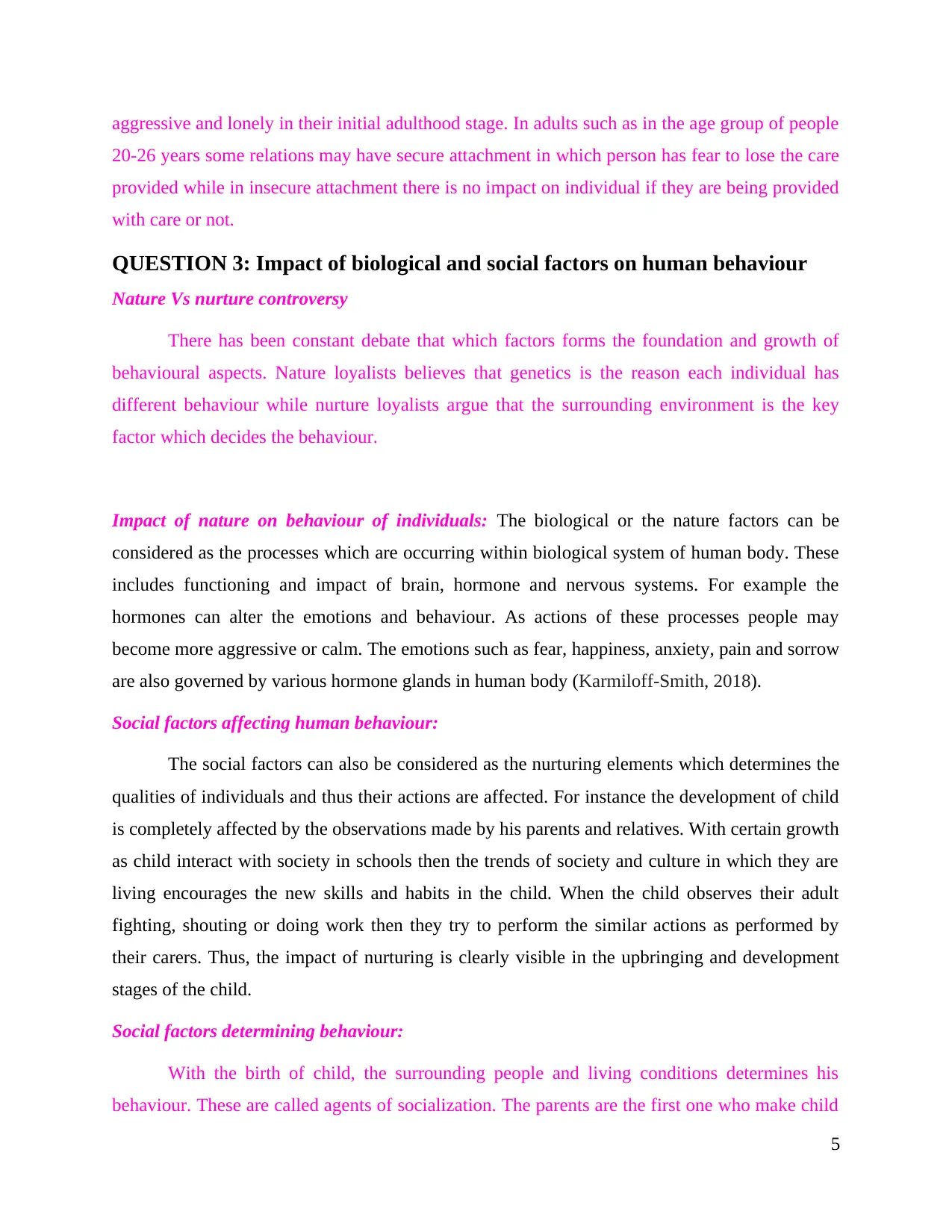
aggressive and lonely in their initial adulthood stage. In adults such as in the age group of people
20-26 years some relations may have secure attachment in which person has fear to lose the care
provided while in insecure attachment there is no impact on individual if they are being provided
with care or not.
QUESTION 3: Impact of biological and social factors on human behaviour
Nature Vs nurture controversy
There has been constant debate that which factors forms the foundation and growth of
behavioural aspects. Nature loyalists believes that genetics is the reason each individual has
different behaviour while nurture loyalists argue that the surrounding environment is the key
factor which decides the behaviour.
Impact of nature on behaviour of individuals: The biological or the nature factors can be
considered as the processes which are occurring within biological system of human body. These
includes functioning and impact of brain, hormone and nervous systems. For example the
hormones can alter the emotions and behaviour. As actions of these processes people may
become more aggressive or calm. The emotions such as fear, happiness, anxiety, pain and sorrow
are also governed by various hormone glands in human body (Karmiloff-Smith, 2018).
Social factors affecting human behaviour:
The social factors can also be considered as the nurturing elements which determines the
qualities of individuals and thus their actions are affected. For instance the development of child
is completely affected by the observations made by his parents and relatives. With certain growth
as child interact with society in schools then the trends of society and culture in which they are
living encourages the new skills and habits in the child. When the child observes their adult
fighting, shouting or doing work then they try to perform the similar actions as performed by
their carers. Thus, the impact of nurturing is clearly visible in the upbringing and development
stages of the child.
Social factors determining behaviour:
With the birth of child, the surrounding people and living conditions determines his
behaviour. These are called agents of socialization. The parents are the first one who make child
5
20-26 years some relations may have secure attachment in which person has fear to lose the care
provided while in insecure attachment there is no impact on individual if they are being provided
with care or not.
QUESTION 3: Impact of biological and social factors on human behaviour
Nature Vs nurture controversy
There has been constant debate that which factors forms the foundation and growth of
behavioural aspects. Nature loyalists believes that genetics is the reason each individual has
different behaviour while nurture loyalists argue that the surrounding environment is the key
factor which decides the behaviour.
Impact of nature on behaviour of individuals: The biological or the nature factors can be
considered as the processes which are occurring within biological system of human body. These
includes functioning and impact of brain, hormone and nervous systems. For example the
hormones can alter the emotions and behaviour. As actions of these processes people may
become more aggressive or calm. The emotions such as fear, happiness, anxiety, pain and sorrow
are also governed by various hormone glands in human body (Karmiloff-Smith, 2018).
Social factors affecting human behaviour:
The social factors can also be considered as the nurturing elements which determines the
qualities of individuals and thus their actions are affected. For instance the development of child
is completely affected by the observations made by his parents and relatives. With certain growth
as child interact with society in schools then the trends of society and culture in which they are
living encourages the new skills and habits in the child. When the child observes their adult
fighting, shouting or doing work then they try to perform the similar actions as performed by
their carers. Thus, the impact of nurturing is clearly visible in the upbringing and development
stages of the child.
Social factors determining behaviour:
With the birth of child, the surrounding people and living conditions determines his
behaviour. These are called agents of socialization. The parents are the first one who make child
5
Paraphrase This Document
Need a fresh take? Get an instant paraphrase of this document with our AI Paraphraser
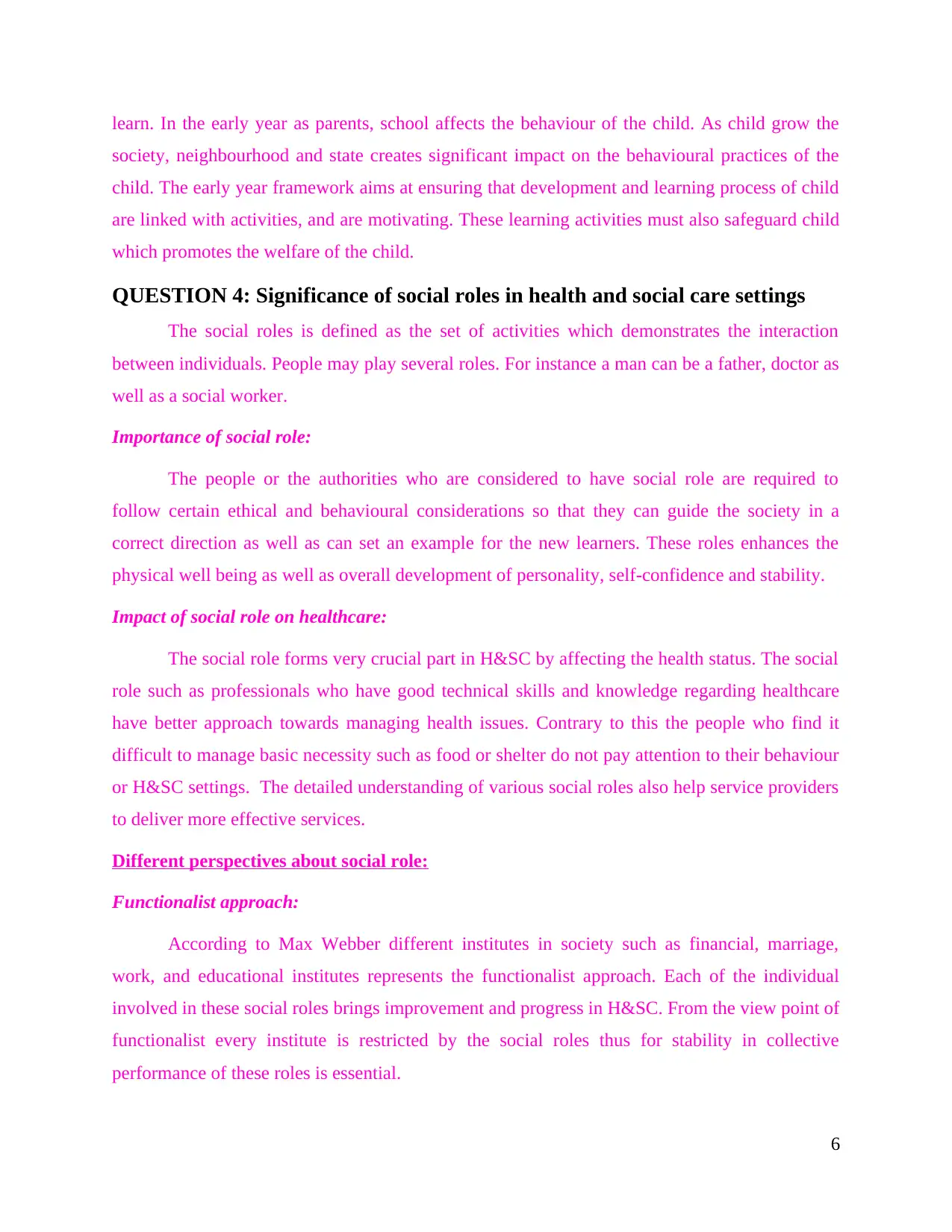
learn. In the early year as parents, school affects the behaviour of the child. As child grow the
society, neighbourhood and state creates significant impact on the behavioural practices of the
child. The early year framework aims at ensuring that development and learning process of child
are linked with activities, and are motivating. These learning activities must also safeguard child
which promotes the welfare of the child.
QUESTION 4: Significance of social roles in health and social care settings
The social roles is defined as the set of activities which demonstrates the interaction
between individuals. People may play several roles. For instance a man can be a father, doctor as
well as a social worker.
Importance of social role:
The people or the authorities who are considered to have social role are required to
follow certain ethical and behavioural considerations so that they can guide the society in a
correct direction as well as can set an example for the new learners. These roles enhances the
physical well being as well as overall development of personality, self-confidence and stability.
Impact of social role on healthcare:
The social role forms very crucial part in H&SC by affecting the health status. The social
role such as professionals who have good technical skills and knowledge regarding healthcare
have better approach towards managing health issues. Contrary to this the people who find it
difficult to manage basic necessity such as food or shelter do not pay attention to their behaviour
or H&SC settings. The detailed understanding of various social roles also help service providers
to deliver more effective services.
Different perspectives about social role:
Functionalist approach:
According to Max Webber different institutes in society such as financial, marriage,
work, and educational institutes represents the functionalist approach. Each of the individual
involved in these social roles brings improvement and progress in H&SC. From the view point of
functionalist every institute is restricted by the social roles thus for stability in collective
performance of these roles is essential.
6
society, neighbourhood and state creates significant impact on the behavioural practices of the
child. The early year framework aims at ensuring that development and learning process of child
are linked with activities, and are motivating. These learning activities must also safeguard child
which promotes the welfare of the child.
QUESTION 4: Significance of social roles in health and social care settings
The social roles is defined as the set of activities which demonstrates the interaction
between individuals. People may play several roles. For instance a man can be a father, doctor as
well as a social worker.
Importance of social role:
The people or the authorities who are considered to have social role are required to
follow certain ethical and behavioural considerations so that they can guide the society in a
correct direction as well as can set an example for the new learners. These roles enhances the
physical well being as well as overall development of personality, self-confidence and stability.
Impact of social role on healthcare:
The social role forms very crucial part in H&SC by affecting the health status. The social
role such as professionals who have good technical skills and knowledge regarding healthcare
have better approach towards managing health issues. Contrary to this the people who find it
difficult to manage basic necessity such as food or shelter do not pay attention to their behaviour
or H&SC settings. The detailed understanding of various social roles also help service providers
to deliver more effective services.
Different perspectives about social role:
Functionalist approach:
According to Max Webber different institutes in society such as financial, marriage,
work, and educational institutes represents the functionalist approach. Each of the individual
involved in these social roles brings improvement and progress in H&SC. From the view point of
functionalist every institute is restricted by the social roles thus for stability in collective
performance of these roles is essential.
6
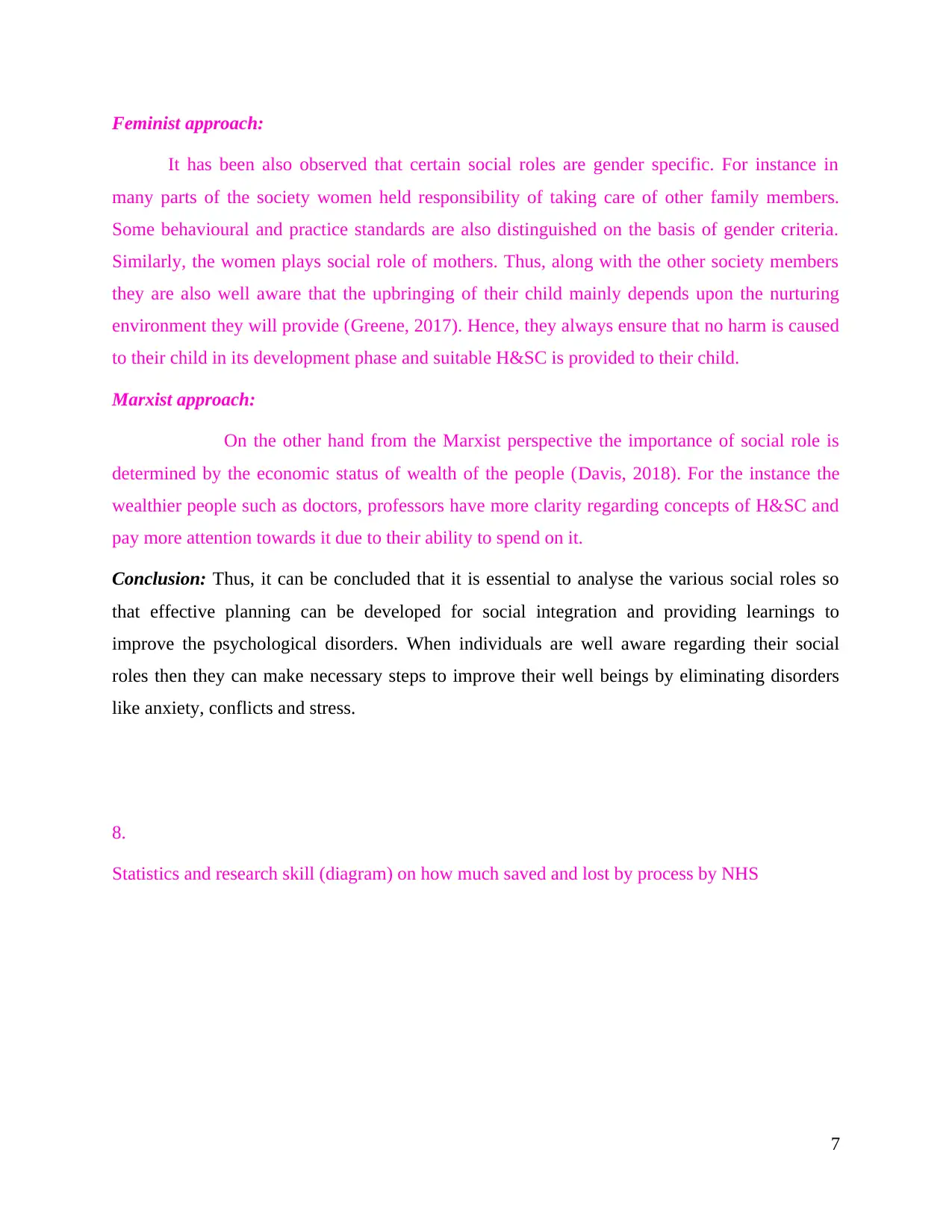
Feminist approach:
It has been also observed that certain social roles are gender specific. For instance in
many parts of the society women held responsibility of taking care of other family members.
Some behavioural and practice standards are also distinguished on the basis of gender criteria.
Similarly, the women plays social role of mothers. Thus, along with the other society members
they are also well aware that the upbringing of their child mainly depends upon the nurturing
environment they will provide (Greene, 2017). Hence, they always ensure that no harm is caused
to their child in its development phase and suitable H&SC is provided to their child.
Marxist approach:
On the other hand from the Marxist perspective the importance of social role is
determined by the economic status of wealth of the people (Davis, 2018). For the instance the
wealthier people such as doctors, professors have more clarity regarding concepts of H&SC and
pay more attention towards it due to their ability to spend on it.
Conclusion: Thus, it can be concluded that it is essential to analyse the various social roles so
that effective planning can be developed for social integration and providing learnings to
improve the psychological disorders. When individuals are well aware regarding their social
roles then they can make necessary steps to improve their well beings by eliminating disorders
like anxiety, conflicts and stress.
8.
Statistics and research skill (diagram) on how much saved and lost by process by NHS
7
It has been also observed that certain social roles are gender specific. For instance in
many parts of the society women held responsibility of taking care of other family members.
Some behavioural and practice standards are also distinguished on the basis of gender criteria.
Similarly, the women plays social role of mothers. Thus, along with the other society members
they are also well aware that the upbringing of their child mainly depends upon the nurturing
environment they will provide (Greene, 2017). Hence, they always ensure that no harm is caused
to their child in its development phase and suitable H&SC is provided to their child.
Marxist approach:
On the other hand from the Marxist perspective the importance of social role is
determined by the economic status of wealth of the people (Davis, 2018). For the instance the
wealthier people such as doctors, professors have more clarity regarding concepts of H&SC and
pay more attention towards it due to their ability to spend on it.
Conclusion: Thus, it can be concluded that it is essential to analyse the various social roles so
that effective planning can be developed for social integration and providing learnings to
improve the psychological disorders. When individuals are well aware regarding their social
roles then they can make necessary steps to improve their well beings by eliminating disorders
like anxiety, conflicts and stress.
8.
Statistics and research skill (diagram) on how much saved and lost by process by NHS
7
⊘ This is a preview!⊘
Do you want full access?
Subscribe today to unlock all pages.

Trusted by 1+ million students worldwide
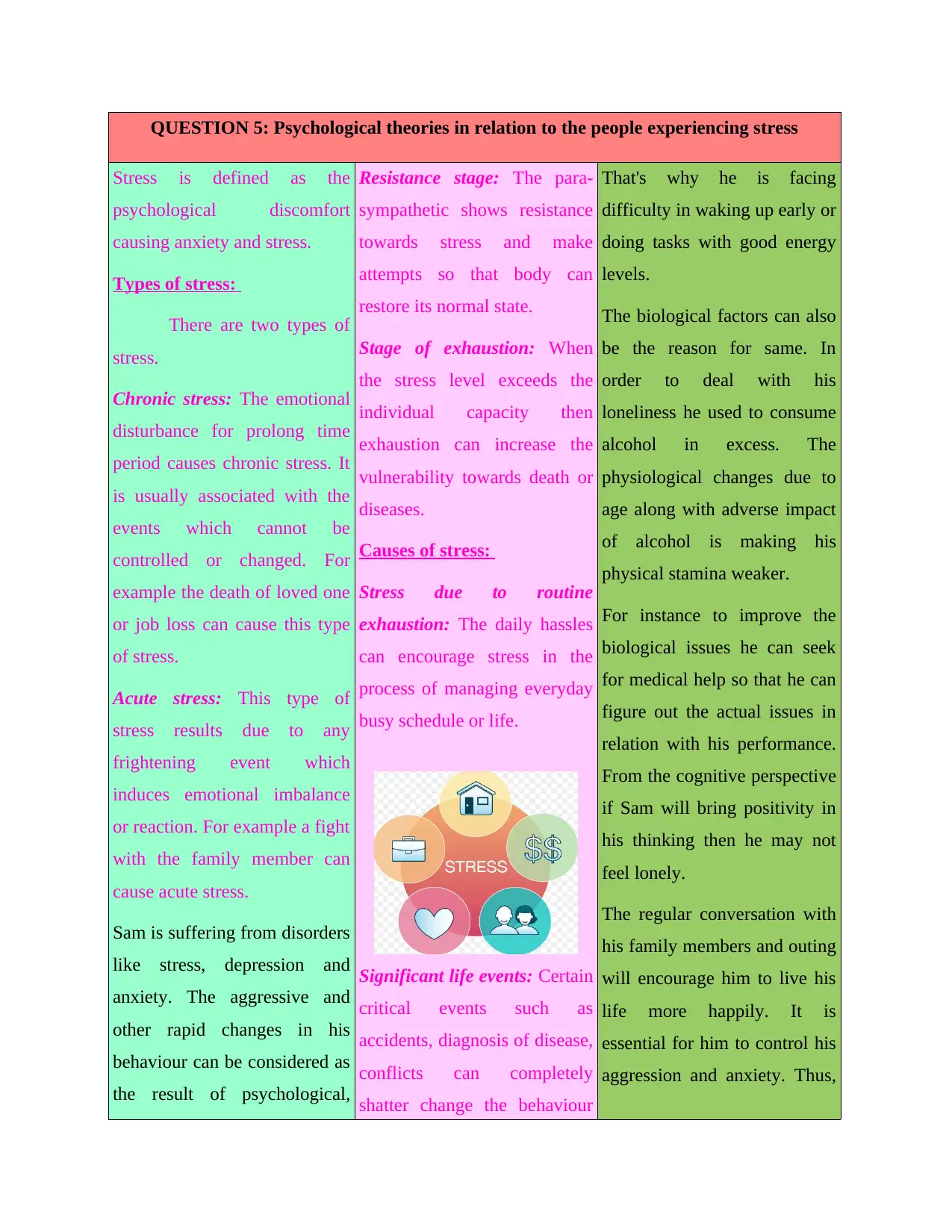
QUESTION 5: Psychological theories in relation to the people experiencing stress
Stress is defined as the
psychological discomfort
causing anxiety and stress.
Types of stress:
There are two types of
stress.
Chronic stress: The emotional
disturbance for prolong time
period causes chronic stress. It
is usually associated with the
events which cannot be
controlled or changed. For
example the death of loved one
or job loss can cause this type
of stress.
Acute stress: This type of
stress results due to any
frightening event which
induces emotional imbalance
or reaction. For example a fight
with the family member can
cause acute stress.
Sam is suffering from disorders
like stress, depression and
anxiety. The aggressive and
other rapid changes in his
behaviour can be considered as
the result of psychological,
Resistance stage: The para-
sympathetic shows resistance
towards stress and make
attempts so that body can
restore its normal state.
Stage of exhaustion: When
the stress level exceeds the
individual capacity then
exhaustion can increase the
vulnerability towards death or
diseases.
Causes of stress:
Stress due to routine
exhaustion: The daily hassles
can encourage stress in the
process of managing everyday
busy schedule or life.
Significant life events: Certain
critical events such as
accidents, diagnosis of disease,
conflicts can completely
shatter change the behaviour
That's why he is facing
difficulty in waking up early or
doing tasks with good energy
levels.
The biological factors can also
be the reason for same. In
order to deal with his
loneliness he used to consume
alcohol in excess. The
physiological changes due to
age along with adverse impact
of alcohol is making his
physical stamina weaker.
For instance to improve the
biological issues he can seek
for medical help so that he can
figure out the actual issues in
relation with his performance.
From the cognitive perspective
if Sam will bring positivity in
his thinking then he may not
feel lonely.
The regular conversation with
his family members and outing
will encourage him to live his
life more happily. It is
essential for him to control his
aggression and anxiety. Thus,
Stress is defined as the
psychological discomfort
causing anxiety and stress.
Types of stress:
There are two types of
stress.
Chronic stress: The emotional
disturbance for prolong time
period causes chronic stress. It
is usually associated with the
events which cannot be
controlled or changed. For
example the death of loved one
or job loss can cause this type
of stress.
Acute stress: This type of
stress results due to any
frightening event which
induces emotional imbalance
or reaction. For example a fight
with the family member can
cause acute stress.
Sam is suffering from disorders
like stress, depression and
anxiety. The aggressive and
other rapid changes in his
behaviour can be considered as
the result of psychological,
Resistance stage: The para-
sympathetic shows resistance
towards stress and make
attempts so that body can
restore its normal state.
Stage of exhaustion: When
the stress level exceeds the
individual capacity then
exhaustion can increase the
vulnerability towards death or
diseases.
Causes of stress:
Stress due to routine
exhaustion: The daily hassles
can encourage stress in the
process of managing everyday
busy schedule or life.
Significant life events: Certain
critical events such as
accidents, diagnosis of disease,
conflicts can completely
shatter change the behaviour
That's why he is facing
difficulty in waking up early or
doing tasks with good energy
levels.
The biological factors can also
be the reason for same. In
order to deal with his
loneliness he used to consume
alcohol in excess. The
physiological changes due to
age along with adverse impact
of alcohol is making his
physical stamina weaker.
For instance to improve the
biological issues he can seek
for medical help so that he can
figure out the actual issues in
relation with his performance.
From the cognitive perspective
if Sam will bring positivity in
his thinking then he may not
feel lonely.
The regular conversation with
his family members and outing
will encourage him to live his
life more happily. It is
essential for him to control his
aggression and anxiety. Thus,
Paraphrase This Document
Need a fresh take? Get an instant paraphrase of this document with our AI Paraphraser
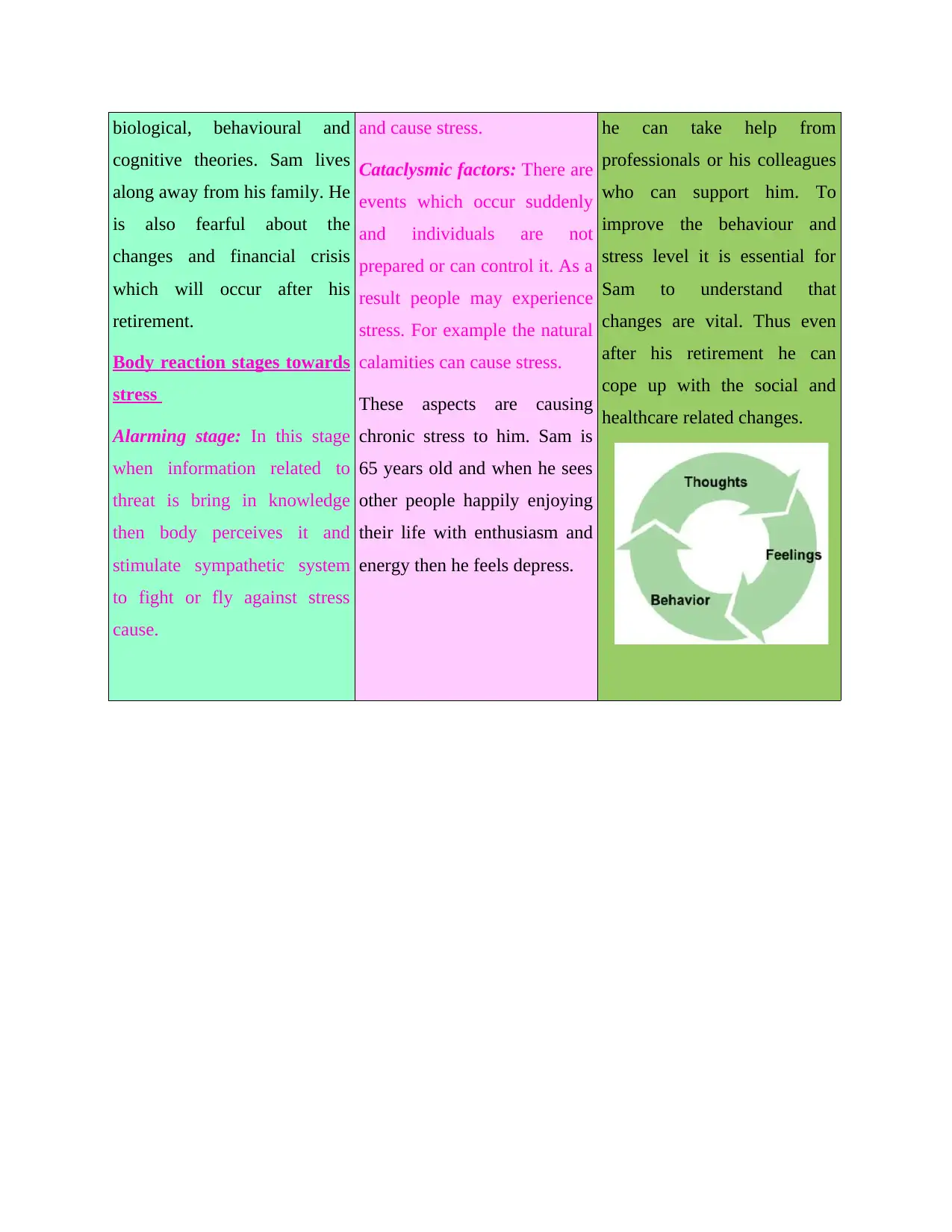
biological, behavioural and
cognitive theories. Sam lives
along away from his family. He
is also fearful about the
changes and financial crisis
which will occur after his
retirement.
Body reaction stages towards
stress
Alarming stage: In this stage
when information related to
threat is bring in knowledge
then body perceives it and
stimulate sympathetic system
to fight or fly against stress
cause.
and cause stress.
Cataclysmic factors: There are
events which occur suddenly
and individuals are not
prepared or can control it. As a
result people may experience
stress. For example the natural
calamities can cause stress.
These aspects are causing
chronic stress to him. Sam is
65 years old and when he sees
other people happily enjoying
their life with enthusiasm and
energy then he feels depress.
he can take help from
professionals or his colleagues
who can support him. To
improve the behaviour and
stress level it is essential for
Sam to understand that
changes are vital. Thus even
after his retirement he can
cope up with the social and
healthcare related changes.
cognitive theories. Sam lives
along away from his family. He
is also fearful about the
changes and financial crisis
which will occur after his
retirement.
Body reaction stages towards
stress
Alarming stage: In this stage
when information related to
threat is bring in knowledge
then body perceives it and
stimulate sympathetic system
to fight or fly against stress
cause.
and cause stress.
Cataclysmic factors: There are
events which occur suddenly
and individuals are not
prepared or can control it. As a
result people may experience
stress. For example the natural
calamities can cause stress.
These aspects are causing
chronic stress to him. Sam is
65 years old and when he sees
other people happily enjoying
their life with enthusiasm and
energy then he feels depress.
he can take help from
professionals or his colleagues
who can support him. To
improve the behaviour and
stress level it is essential for
Sam to understand that
changes are vital. Thus even
after his retirement he can
cope up with the social and
healthcare related changes.
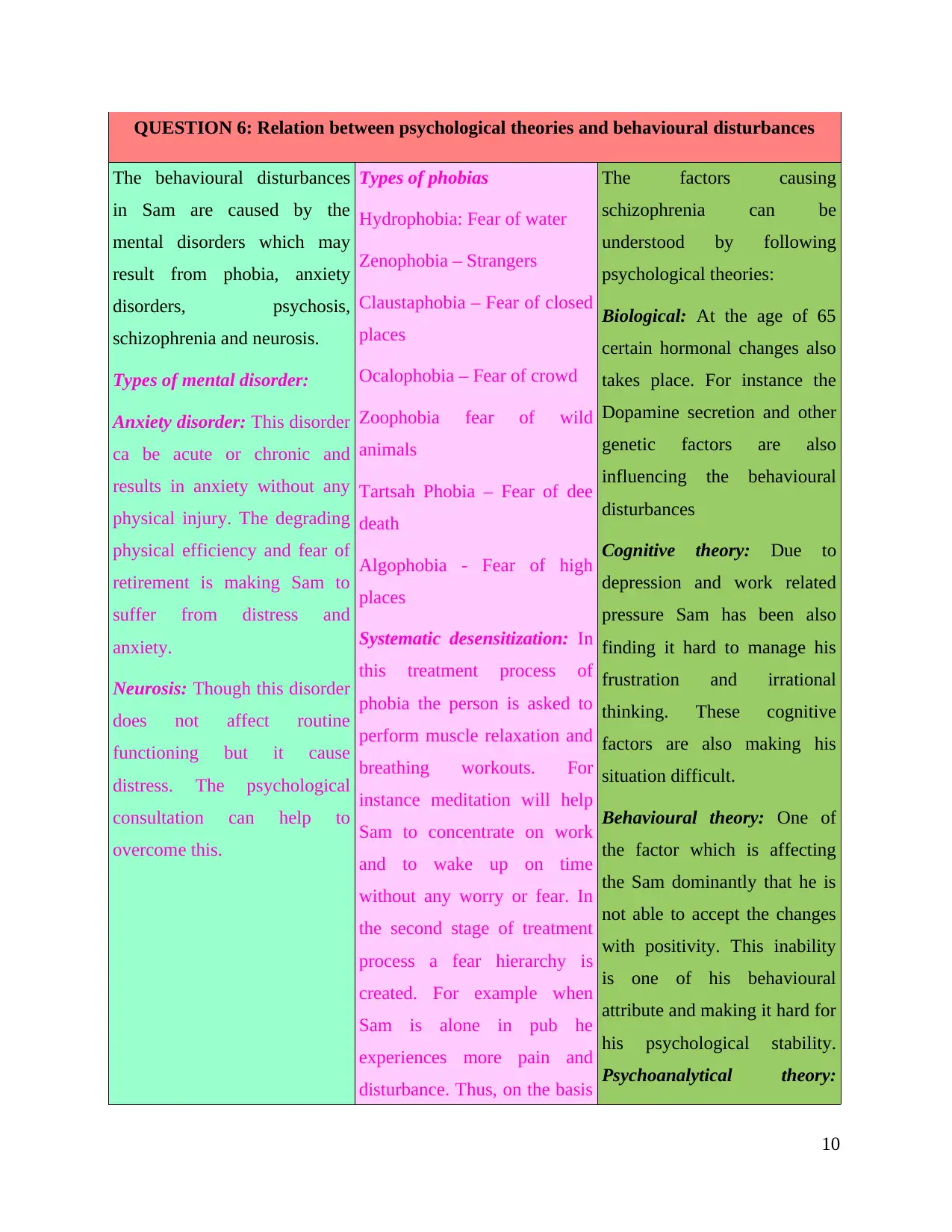
QUESTION 6: Relation between psychological theories and behavioural disturbances
The behavioural disturbances
in Sam are caused by the
mental disorders which may
result from phobia, anxiety
disorders, psychosis,
schizophrenia and neurosis.
Types of mental disorder:
Anxiety disorder: This disorder
ca be acute or chronic and
results in anxiety without any
physical injury. The degrading
physical efficiency and fear of
retirement is making Sam to
suffer from distress and
anxiety.
Neurosis: Though this disorder
does not affect routine
functioning but it cause
distress. The psychological
consultation can help to
overcome this.
Types of phobias
Hydrophobia: Fear of water
Zenophobia – Strangers
Claustaphobia – Fear of closed
places
Ocalophobia – Fear of crowd
Zoophobia fear of wild
animals
Tartsah Phobia – Fear of dee
death
Algophobia - Fear of high
places
Systematic desensitization: In
this treatment process of
phobia the person is asked to
perform muscle relaxation and
breathing workouts. For
instance meditation will help
Sam to concentrate on work
and to wake up on time
without any worry or fear. In
the second stage of treatment
process a fear hierarchy is
created. For example when
Sam is alone in pub he
experiences more pain and
disturbance. Thus, on the basis
The factors causing
schizophrenia can be
understood by following
psychological theories:
Biological: At the age of 65
certain hormonal changes also
takes place. For instance the
Dopamine secretion and other
genetic factors are also
influencing the behavioural
disturbances
Cognitive theory: Due to
depression and work related
pressure Sam has been also
finding it hard to manage his
frustration and irrational
thinking. These cognitive
factors are also making his
situation difficult.
Behavioural theory: One of
the factor which is affecting
the Sam dominantly that he is
not able to accept the changes
with positivity. This inability
is one of his behavioural
attribute and making it hard for
his psychological stability.
Psychoanalytical theory:
10
The behavioural disturbances
in Sam are caused by the
mental disorders which may
result from phobia, anxiety
disorders, psychosis,
schizophrenia and neurosis.
Types of mental disorder:
Anxiety disorder: This disorder
ca be acute or chronic and
results in anxiety without any
physical injury. The degrading
physical efficiency and fear of
retirement is making Sam to
suffer from distress and
anxiety.
Neurosis: Though this disorder
does not affect routine
functioning but it cause
distress. The psychological
consultation can help to
overcome this.
Types of phobias
Hydrophobia: Fear of water
Zenophobia – Strangers
Claustaphobia – Fear of closed
places
Ocalophobia – Fear of crowd
Zoophobia fear of wild
animals
Tartsah Phobia – Fear of dee
death
Algophobia - Fear of high
places
Systematic desensitization: In
this treatment process of
phobia the person is asked to
perform muscle relaxation and
breathing workouts. For
instance meditation will help
Sam to concentrate on work
and to wake up on time
without any worry or fear. In
the second stage of treatment
process a fear hierarchy is
created. For example when
Sam is alone in pub he
experiences more pain and
disturbance. Thus, on the basis
The factors causing
schizophrenia can be
understood by following
psychological theories:
Biological: At the age of 65
certain hormonal changes also
takes place. For instance the
Dopamine secretion and other
genetic factors are also
influencing the behavioural
disturbances
Cognitive theory: Due to
depression and work related
pressure Sam has been also
finding it hard to manage his
frustration and irrational
thinking. These cognitive
factors are also making his
situation difficult.
Behavioural theory: One of
the factor which is affecting
the Sam dominantly that he is
not able to accept the changes
with positivity. This inability
is one of his behavioural
attribute and making it hard for
his psychological stability.
Psychoanalytical theory:
10
⊘ This is a preview!⊘
Do you want full access?
Subscribe today to unlock all pages.

Trusted by 1+ million students worldwide
1 out of 19
Related Documents
Your All-in-One AI-Powered Toolkit for Academic Success.
+13062052269
info@desklib.com
Available 24*7 on WhatsApp / Email
![[object Object]](/_next/static/media/star-bottom.7253800d.svg)
Unlock your academic potential
Copyright © 2020–2026 A2Z Services. All Rights Reserved. Developed and managed by ZUCOL.




